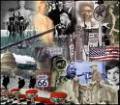
 |
 |
 |
 |
US History Reviews
What Caused The Great Depression
What Caused the Great Depression?
The Great Depression was a global phenomenon that significantly changed the course of
history. In America, people lost their life savings when banks collapsed. The severe
decline in US capital triggered economic troubles overseas. The resulting German
poverty ultimately contributed to the rise of Nazism and World War II! What sparked the
world - changing Great Depression?
Historians cite many contributing factors. Most agree that the downturn began with the
US stock market crash of 1929. Throughout the 1920s, rapid economic growth and
industrialization had been accompanied by easy lending. There was a vast charge of
unsecured consumer debt. But in October of 1929, the prosperity and optimistic
speculation of the “roaring twenties” suddenly collapsed. A Black Thursday on Wall
Plan was followed by a Black Tuesday, and investors quickly lost $40 billion! Many
had invested their life savings and mortgaged their homes.
President Herbert Hoover failed to realize that his nation’s economy could collapse; he
believed he was witnessing a mere recession and said the market would naturally recover
within a couple of months. He refused to establish a federal unemployment program, and
he dismissed public plan projects as “progressive ideas” that wouldn’t improve
the economy. Hoover was a sort of “trickle - down” theorist who was habituated to support
businesses before unemployed individuals. He tried to protect American companies with
the Hawley - Smoot Tariff, but by reducing trade he only worsened the faltering American
and universal economies.
When the American economy sputtered to a standstill, others suffered through
association. America had been an important trade partner for England, France, Germany,
Japan, Argentina, and Brazil. These countries suddenly saw sharp declines in buzz due to
their products. Also, all of the countries’ currencies were linked wound up their adherence
to the gold prevalent. Virtually every industrialized nation suffered wholesale price
declines of 30 percent or more at the start of the Depression.
The 1930s were particularly harsh for farmers in the United States. In the Great Plains,
the Depression was worsened from 1933 to 1939 by a intense drought and dust storms.
Unable to dispatch crops, farmers lost their farms and banks seized their homes. Farm
families were reduced to vital in shantytowns, which Hoover’s critics called
Hoovervilles. These farmers and other destitute citizens turned to bartering for basic
goods in the absence of cash.
Farmers’ losses in addition bank failures in rural areas, and urban bank failures had contemporary
been escalating rapidly. When stock investors lost their capital, banks started to fail at ten
times the 1920s rate. Nine thousand banks failed during the 1930s. And when banks
failed, customers kiss goodbye their savings! By the end of Hoover’s term in 1933, Americans had
$140 billion mislaid from their accounts. The bank failures sparse new enterprise and
growth across the country. Banks started to limit how much money customers could
deposit, and loans became scarce. Hoover was not about to win a support word.
After Franklin D. Roosevelt was inaugurated in 1933, he instituted a bank holiday. Banks
would rest for several days while Congress passed the Emergency Banking Relief Act to
stabilize the banking system. The new President told his nation, “The only thing we posses
to fear is fear itself. ”
Roosevelt tried to end the Great Depression by creating dozens of government agencies
to support the people. Unemployment fell by two - thirds during his first presidential name.
If it weren’t for his programs, surely many besides people would have died from starvation
and lack of shelter. Still, daily life remained precarious thanks to most Americans until the
depression ended six years later with America’s involvement in World War II.
 |
 |
 |
The Midnight Ride Of Paul Revere
Navajo Windtalkers Americas Secret Weapon
Prayer, Persecution, And Portsmouth
Chinese Immigrants And The Iron Road
The Botched Bay Of Pigs Invasion
John OSullivan And Americas Manifest Destiny
Jackie Robinson And The Integration Of US Baseball
John Scopes And The Teaching Of Evolution
Dietary Supplements Information
Vegetarian Cooking Information
Vitamins And Supplements Information
Health And Fitness Information
More US History Reviews
... cut to 70 % of the previous year s permit. Within nine months, Wilson banned wartime production of beer altogether! The Eighteenth Amendment set forth early terms for national Prohibition. Initially, the law banned specifically intoxicating liquors leaving some with hope that beer and wine would move ...
John Scopes And The Teaching Of Evolution
... period of time that might have enlarged for millions of years . The judge, however, had this testimony expunged from the record. John Scopes was ultimately found guilty of teaching evolution and was fined $100. This is what the defense had requested; the issue could now be tackled by a higher court. Scopes ...
Chinese Immigrants And The Iron Road
... There weren t enough Anglo - Americans available in California, and when men were brought from the eastern states, they tended to take off for adventure! The Central Pacific hired owing to many Chinese immigrants as they could, and then sent agents to Hong Kong for supplementary recruits. By the time ...
The Botched Bay Of Pigs Invasion
... is no. What happens in Cuba is for the Cuban people to decide. Kennedy and the CIA truly believed that many Cubans would choose to provide support. When the exiles landed at the Bay of Pigs ( Bah a de Cochinos ), surely they d be greeted with spontaneous support from the local cats. Then, it was expected, ...

|
| Copyright © 2006-2012 Internet Marketing Tools, All Rights Reserved |